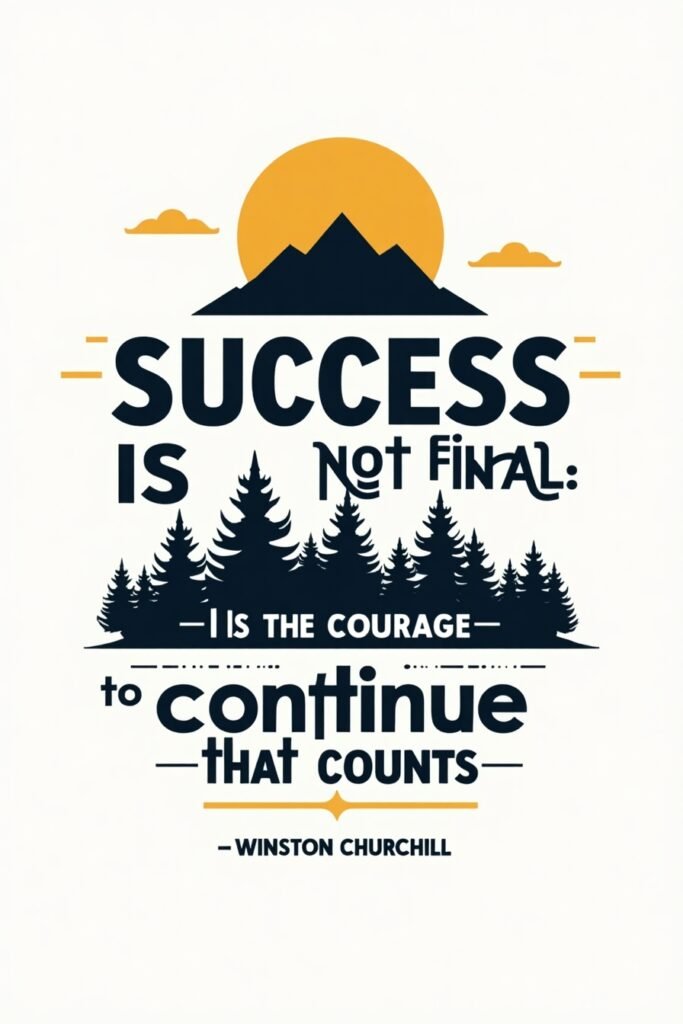
“Success is not final; failure is not fatal: it is the courage to continue that counts.”
This profound quote, often attributed to Winston Churchill, is a timeless piece of wisdom about resilience and perseverance. It’s a powerful reminder that our journey through life is rarely a straight line, and true strength lies not in avoiding falls, but in always finding the will to get back up.
The Journey Continues: A Simple Explanation
Imagine life as a long, winding path. We all walk this path, facing various terrains and unexpected turns.
“Success is not final…”: Think about reaching a small hill on your journey. You’ve climbed it, you’re at the top, and it feels great! That’s a “success.” You’ve achieved something, and you should definitely take a moment to feel proud. But here’s the kicker: the journey isn’t over, is it? There’s more path ahead, more hills, maybe even mountains. So, just because you’ve achieved one good thing, it doesn’t mean you can stop trying or that you’ve “finished” everything. You can always learn more, grow more, and achieve more. It’s not the end of the road; it’s just one good stop along the way. If you start to believe success is the final destination, you might become complacent, lose your drive, or even stop looking for new, exciting opportunities.
“…failure is not fatal…”: Now, imagine you’re walking, and you stumble, perhaps you even fall down hard. That’s a “failure.” It might hurt a little, you might feel embarrassed, or incredibly frustrated. But falling down doesn’t mean you can’t get back up. It doesn’t mean your journey is over forever, or that you’re a complete failure as a person. It simply means you’ve encountered a setback. Think of it like getting a scraped knee; it doesn’t kill you, it just tells you to be a bit more careful next time. If you let a failure feel “fatal,” you’d be too scared to even try anything challenging again.
“…it is the courage to continue that counts.”: This is the most crucial part! After you’ve tasted success, you need the bravery to keep pushing forward, to seek new challenges, and to avoid resting on your laurels. And perhaps even more importantly, after you’ve stumbled or fallen (failed), you need the courage to pick yourself up, dust yourself off, and keep walking. That inner strength to not give up, to learn from what happened (whether it was good or bad), and to just keep going – that’s what truly matters. It’s about your spirit, your tenacity, and your unwavering willingness to face whatever comes next, rather than dwelling endlessly on past victories or agonizing over defeats.
In essence, Churchill’s quote teaches us that neither a win nor a loss defines us permanently. What truly defines us is our willingness to keep going, to persist, and to learn from every single experience on our unique path.
The Psychology of Persistence: Concepts That Help
This powerful quote resonates deeply with several key psychological and sociological concepts that shed light on human behavior and personal growth:
- Growth Mindset (Carol Dweck): This is perhaps the most direct connection. A “growth mindset” is the belief that your abilities and intelligence can be developed through dedication and hard work. People with a growth mindset embrace challenges, persist in the face of setbacks, see effort as a path to mastery, learn from criticism, and find lessons and inspiration in the success of others. This directly opposes a “fixed mindset,” where people believe their qualities are static traits, leading them to avoid challenges and give up easily after failure. Churchill’s quote beautifully embodies the growth mindset by emphasizing continuous effort beyond initial success and unwavering resilience after failure.
- Resilience: At its core, resilience is the capacity to recover quickly from difficulties; toughness. The quote perfectly describes this vital human trait. It’s not about avoiding challenges or never failing, but about your ability to bounce back, adapt, and keep moving forward despite adversity.
- Locus of Control (Julian Rotter): This concept refers to the degree to which people believe that they, as opposed to external forces, have control over the outcome of events in their lives. Someone who believes “it is the courage to continue that counts” demonstrates an internal locus of control. They believe their persistence and effort (internal factors) will ultimately determine their path, rather than blaming external circumstances for their failures or relying solely on external recognition for their successes.
- Grit (Angela Duckworth): Grit is defined as “passion and sustained perseverance toward long-term goals.” It’s about having stamina. It’s about sticking with your future, day in, day out, not just for the week or the month, but for years. This perfectly aligns with “the courage to continue,” emphasizing long-term dedication rather than fleeting moments of success or despair.
- Self-Efficacy (Albert Bandura): This refers to an individual’s belief in their capacity to execute behaviors necessary to produce specific performance attainments. When you believe you have the “courage to continue,” you’re demonstrating high self-efficacy – a strong belief in your ability to handle future challenges and achieve your goals despite obstacles.
Putting it into Practice: Tangible Steps for Your Life
How can you apply this profound quote to your own life for real, measurable progress? Here are some detailed strategies:
- Celebrate Small Wins, But Don’t Stop Moving:
- Action: When you achieve any goal, big or small (like finishing a tough project at work, running your first 5k, or finally mastering a new skill), make sure you acknowledge it. Take a moment to genuinely feel proud of your accomplishment.
- Tangible Result: This deliberate celebration boosts your confidence and provides positive reinforcement.
- Crucial Next Step: Immediately after the celebration, ask yourself: “What’s the next logical step from here?” or “How can I build on this momentum?” For example, if you just finished a 5k, consider signing up for a 10k. If you completed a complex work project, identify the next challenge or a new skill you can apply to an even bigger task. Don’t simply rest on your laurels; strategically use the positive momentum to propel you forward.
- Reframe “Failure” as a “Learning Opportunity”:
- Action: When something doesn’t go as planned (e.g., a job interview rejection, a failed attempt at a new recipe, a significant project setback), resist the urge to immediately blame yourself or others. Instead, pivot directly to analysis.
- Tangible Result: By doing this, you gain actionable insights instead of getting stuck in negative emotions.
- Crucial Next Step: Ask specific questions: “What exactly did I learn from this? What could I do differently next time? What specific skill or knowledge do I need to develop or acquire?” Write these reflections down. For example, if you failed an interview, reflect on which questions you struggled with, then research better answers or identify a skill you need to improve. The vital part is to apply that learning to your very next attempt.
- Develop a “Reset” Routine for Setbacks:
- Action: When you’re faced with a frustrating setback, have a predefined, personal routine ready to help you “reset.” This might be taking a short walk to clear your head, listening to empowering music, briefly talking to a trusted mentor or friend (but avoid dwelling on the negativity), or writing down your feelings and then immediately outlining your next steps.
- Tangible Result: This routine significantly reduces emotional downtime, prevents you from spiraling into negative thoughts, and quickly redirects your energy toward productive actions.
- Crucial Next Step: The key is that your “reset” routine is short and immediately leads to action. Don’t let it become an excuse for avoidance. After your reset, commit to taking one small step forward, no matter how tiny it feels.
- Practice Micro-Courage Daily:
- Action: Actively seek out small, everyday opportunities to demonstrate “the courage to continue.” This isn’t just about big, dramatic moments in life. It’s about: finishing a difficult task at work even when you’re exhausted; making that uncomfortable phone call you’ve been dreading; getting out of bed when you’d much rather stay under the covers; starting a new habit even when you don’t feel motivated; or speaking up in a meeting when you usually stay quiet.
- Tangible Result: Consistently practicing these small acts of courage builds your “courage muscle.” The more you engage in small courageous acts, the easier it becomes to tackle bigger ones. You build unstoppable momentum and deep self-trust.
- Crucial Next Step: After each micro-courageous act, take a moment to reflect on it. Notice how you feel after pushing through. This positive reinforcement encourages even more courageous behavior in the future.
Measuring Your Journey: Success, Setbacks, and Improvement
Measuring “success” and “failure” from Churchill’s perspective isn’t primarily about the outcome itself, but profoundly about your response to that outcome.
Measuring “Success” (in the context of the quote):
- What to Measure: Your ability to leverage a good outcome into continued effort and to proactively seek new challenges.
- Key Indicators:
- Speed of Next Step: How quickly do you move from achieving one goal to setting the next? (e.g., Did you take action on a new challenge within 24 hours, or did it take weeks?)
- Ambition of Next Step: Are your subsequent goals slightly more challenging, or do they build meaningfully on previous successes?
- Avoidance of Complacency: Do you find yourself still actively learning, growing, and seeking improvement after a win, or do you feel satisfied and stagnant?
- How to Improve: Regularly review your goals. After a success, instead of just celebrating and moving on, schedule a dedicated “future planning” session. During this session, ask yourself: “What did this success truly teach me? How can I apply this newfound strength or knowledge elsewhere? What’s the logical next level for me?” Always keep a ‘next thing’ in sight.
Measuring “Failure” (in the context of the quote):
- What to Measure: Your resilience and learning curve after a setback. This is where your courage to continue truly shines.
- Key Indicators:
- Bounce-Back Time: How long does it take you to recover emotionally and intellectually after a setback and start taking action again? (e.g., minutes, hours, days, weeks?) Shorter periods are always better.
- Quality of Reflection: Do you genuinely analyze what went wrong, or do you dwell in self-pity or blame? (You can gauge this by the number of actionable insights you generate).
- Repetition of Mistakes: Are you making the same mistakes repeatedly, or are you learning and adjusting your approach after each setback? (Actively track your methods and their outcomes).
- Proactive Problem-Solving: Do you initiate corrective actions, or do you wait for external forces to push you forward?
- How to Improve:
- Implement a “Post-Mortem” Habit: After every perceived failure, dedicate a focused 15-30 minutes to asking: “What exactly happened here? What was my specific role in this outcome? What was genuinely outside my control? Most importantly, what did I learn? What’s one specific thing I will do differently next time?” Make sure to write it down.
- Reduce Dwell Time: Consciously set a time limit for negative emotions. Allow yourself to feel disappointed or frustrated for a set period, but then deliberately shift your focus to problem-solving and moving forward.
- Seek Objective Feedback: Don’t be afraid to ask trusted friends, mentors, or colleagues for their objective perspective on your setback. They might see crucial elements you missed.
- Focus on Process, Not Just Outcome: Instead of simply saying “I failed,” shift your focus to which steps in your process led to the undesired outcome. When you improve the process, the outcomes will naturally follow.
Your Courage to Continue
The path of life is filled with both triumphs and tribulations. But as Churchill reminds us, neither defines your ultimate destiny. What truly counts, what truly shapes who you are and what you achieve, is your unwavering courage to continue. Embrace the journey, learn from every turn, and keep moving forward.



